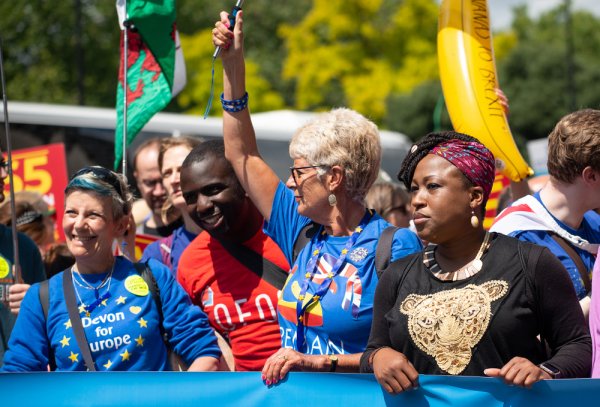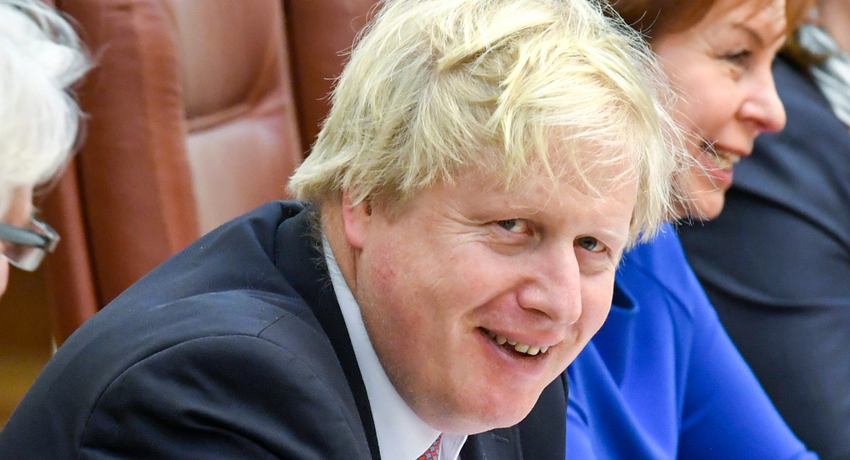What do we know about Boris Johnson’s track record so far in terms of women’s rights?
Boris Johnson has a notoriously bad track record when it comes to how he views women and women’s rights, throughout his multiple careers. As a journalist in the 1990s and 2000s, he made numerous sexist gaffes. Lamenting the reaction to Princess Diana’s death in 1997, he wrote that “we live in an age where feminism is a fact, where giving vent to emotion in public wins votes”. In the same decade, his female colleagues publicly complained about Johnson pinning a glamour calendar featuring nude and sexualised photographs of women, even after receiving multiple complaints that it was making them uncomfortable. In a 2005 farewell piece marking his exit as the Spectator’s editor, he advised his successor to “just pat [their female publisher] on the bottom and send her on her way”.
This kind of behaviour continued in his various political roles. During his 2005 campaign to become a Conservative MP he stated that “voting Tory will cause your wife to have bigger breasts”. He also expressed how “magnificent” it was to watch “semi-naked women playing beach volleyball … glistening like wet otters” during the 2012 London Olympics which he hosted as then-Mayor.
Such sexist behaviour is also evident in his voting patterns. As MP, he has continuously abstained from voting on any sort of abortion legislation and, in 2015, comprised one of the 305 MPs who opposed cutting the tampon tax (where tampons are legally considered and taxed as a ‘luxury’ and an ‘unnecessary’ product) which caused the amendment bill to be rejected.

“As I write these words there are semi-naked women playing beach volleyball in the middle of the Horse Guards Parade immortalised by Canaletto. They are glistening like wet otters and the water is plashing off the brims of the spectators’ sou’westers. The whole thing is magnificent and bonkers.” Boris Johnson, The Telegraph
While he has pledged as Prime Minister to increase the representation of women and minorities in his Cabinet, and has a target of women comprising 50% of conservative candidates, less than a third of his Cabinet are women and he has not yet offered any plans or solutions as to how they’re going to achieve this. Additionally, he has vowed to tackle unequal gender pay barriers, but has previously opposed multiple solutions – such as an annual report on the gender pay gap, and failed to vote on a gender equality strategy.
Johnson’s behaviour has often been said to be ‘Trump-like’. Is this an accurate comparison?
Aside from the obvious corporeal comparisons – both are older cisgender, heterosexual white men with scruffy blonde hair who play up their dishevelled but hegemonic masculine persona – they have multiple things in common. Both embody a populist image of being the ‘everyman’ who is against ‘the elite’ despite being from the upper-class privileged elite. Trump and Johnson are both impulsive, media-hungry and share a history of making numerous misogynistic, racist and homophobic remarks. They also support a kind of politics that further marginalises vulnerable people while claiming to fight for the ‘average’ citizen, and have ties to the alt-right.
Having said that, their political leanings do differ. While Trump is a protectionist authoritarian, Johnson leans more towards a laissez-faire Tory liberal with economically conservative and more socially liberal views, where in the past he has supported LGBTQIA+ rights. Despite this, however, the comparison still stands.
In one of his Telegraph columns from 2018, Johnson compared veiled Muslim women to ‘bank robbers’ and ‘letter boxes’
In the past, Johnson has made several derogatory and racialised remarks regarding Muslim women, and women of color. Where does he stand on these issues now?
Johnson has made multiple racist remarks as a journalist and politician, particularly in his notorious 2002 Spectator op-ed, titled ‘Africa is a mess, but we can’t blame colonialism’, and not much has changed in recent years. In one of his Telegraph columns from 2018, he compared veiled Muslim women to ‘bank robbers’ and ‘letter boxes’. A watchdog has since found that it significantly increased Islamophobic and misogynistic attacks on Muslim women in the weeks following.
While his Cabinet is the most ethnically diverse in UK history – with Sajid Javid as Chancellor, Priti Patel as Home Secretary and four other PoC (People of Colour) ministers – it seems to be a performative attempt to appear inclusive and to distract the public from the racism within the Tory party and Johnson’s past. It also reflects the greater diversity of UK parliament where there were only 15 ethnic minorities in 2010 increasing to 52 in 2019.
However, to quote civil rights activist Maya Angelou: “When someone shows you who they are, believe them”. Johnson has continuously shown us who he is while using immigration, particularly Muslim immigration and refugees, as a political football to further his own agenda.

Dr. Shola Mos-Shogbamimu – Women’s Rights activist at the March for Change demonstration, to push the government to revoke Article 50 and stop the UK’s EU exit, 20 July 2019. Image: Shutterstock
Boris Johnson has called himself a feminist. Is this a title he can bestow upon himself?
There is a recent trend of male conservative politicians and political leaders self-proclaiming to be feminists, despite their track-record of anti-women policies, to assuage their ‘woman problem’. Though Johnson has claimed to be a feminist, he has been completely silent when it comes to voting on policies that directly impact women. And while he denies being sexist, numerous politicians and former colleagues have publicly commented on his ‘disrespectful and patronising’ behaviour towards his female colleagues.
What’s more, he has not earned the trust or respect of UK women who have been far more sceptical of his ascension – only 25% of women believe it’s a good thing in comparison to 43% of men. Johnson can certainly try to assert the title, but it is his actions that really matter and so far they leave a lot to be desired.
Unlike Trump, however, Johnson hasn’t explicitly expressed any views that could potentially roll back women’s rights
As we’ve witnessed in recent years, populist leaders and their policies don’t often go hand in hand with women’s rights. What can we expect from Johnson in terms of gender equality in the UK?
Despite Johnson’s socially liberal-ish leanings for a Tory MP, his history of misogyny, accusations of sexism and political record of complete inaction towards women’s rights indicates that he will not prioritise issues regarding gender equality. Unlike Trump, however, Johnson hasn’t explicitly expressed any views that could potentially roll back women’s rights – such as Trump’s comments surrounding abortion and his decision to change definitions of domestic violence and sexual assault – and is instead rather quiet on the whole.
Realistically, not much will change for better or for worse at the hands of Johnson himself which, at a time when women are still financially, politically and socially disadvantaged and where two women a week are murdered at the hands of their current or former male partners, is just not good enough.





